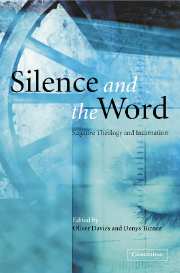Book contents
- Frontmatter
- Contents
- Notes on contributors
- Preface
- Introduction
- 1 Apophaticism, idolatry and the claims of reason
- 2 The quest for a place which is ‘not-a-place’: the hiddenness of God and the presence of God
- 3 The gift of the Name: Moses and the burning bush
- 4 Aquinas on the Trinity
- 5 Vere tu es Deus absconditus: the hidden God in Luther and some mystics
- 6 The deflections of desire: negative theology in trinitarian disclosure
- 7 The formation of mind: Trinity and understanding in Newman
- 8 ‘In the daylight forever?’: language and silence
- 9 Apophasis and the Shoah: where was Jesus Christ at Auschwitz?
- 10 Soundings: towards a theological poetics of silence
- Select bibliography
- Index
10 - Soundings: towards a theological poetics of silence
Published online by Cambridge University Press: 22 September 2009
- Frontmatter
- Contents
- Notes on contributors
- Preface
- Introduction
- 1 Apophaticism, idolatry and the claims of reason
- 2 The quest for a place which is ‘not-a-place’: the hiddenness of God and the presence of God
- 3 The gift of the Name: Moses and the burning bush
- 4 Aquinas on the Trinity
- 5 Vere tu es Deus absconditus: the hidden God in Luther and some mystics
- 6 The deflections of desire: negative theology in trinitarian disclosure
- 7 The formation of mind: Trinity and understanding in Newman
- 8 ‘In the daylight forever?’: language and silence
- 9 Apophasis and the Shoah: where was Jesus Christ at Auschwitz?
- 10 Soundings: towards a theological poetics of silence
- Select bibliography
- Index
Summary
For all the variety of content and diversity of approach evident in the preceding chapters, a common theme runs through them all: negation, variously conceived, is not to be seen as an adjunct to conventional Christian affirmations but rather as an integral element in their expressive power. Apophasis not only distinguishes Christian speech from ordinary human speech acts, setting the limit of what can be said about God, but also signals the sense that Christian speech is grounded at its origins in a Trinitarian dynamic, or even discourse, whose provenance is revelatory. This distinction is a crucial one, for it marks the point at which Christian apophasis as a semiotic phenomenon is overtaken by its dynamic as pragmatic language use. In other words, the need to negate in Christian apophatic discourse is not grounded in a recognition of the limits of language and expression as such, or at least not in that alone. Rather, it is shaped within particular liturgical communities who are called to give verbal expression to a specific intervention of God in history. Apophasis in this sense articulates the human response to a divine communicative presence, and it is burdened as much by an excess of presence as it is by an endemic sense of absence.
- Type
- Chapter
- Information
- Silence and the WordNegative Theology and Incarnation, pp. 201 - 222Publisher: Cambridge University PressPrint publication year: 2002
- 1
- Cited by



